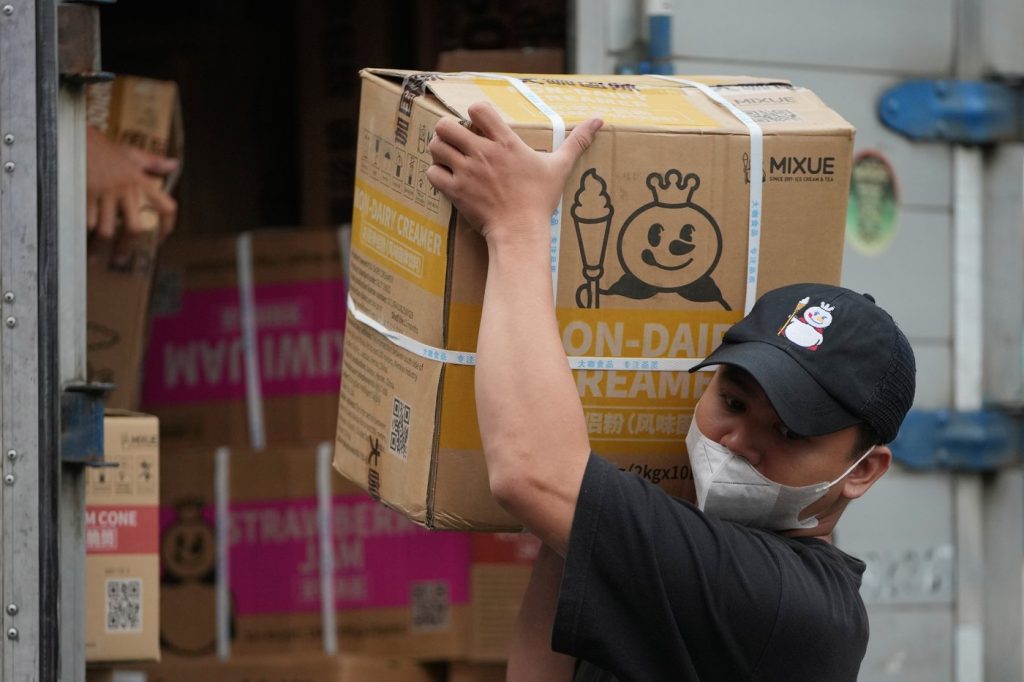HONG KONG (AP) – Chinese food and beverage brands are increasingly making their mark in Southeast Asia, providing viable alternatives to established American chains while simultaneously enhancing China's commercial and cultural influence in the region. A prime example of this trend is the Mixue Group, which has claimed the title of the world's largest food and beverage chain by the number of outlets, surpassing giants such as Starbucks and McDonald's.
Mixue, whose name translates to "Honey Snow Ice City," is effectively targeting the region's demand for sweet treats by offering an affordable range of ice cream, coffee, and bubble tea drinks. In Indonesia alone, where the brand operates more than 2,600 outlets, there is a popular saying that any empty shop will soon turn into a Mixue store, illustrating the brand's rapid expansion.
Rahma Yuliana, a single mother who runs an online business, illustrates the appeal of Mixue's offerings. She regularly takes her daughter for after-school treats, such as a cup of brown sugar milk tea priced at $1.10, which is approximately one-third less expensive than similar products from rival Taiwanese chain Chatime. Additionally, an ice cream cone is available for as little as 50 cents, making it a competitive offering compared to McDonald's.
As of September, Mixue Group operated over 45,000 stores worldwide, significantly more than Starbucks and McDonald's. About 40,000 of these locations are based in China. Meanwhile, throughout Southeast Asia, more than 6,100 outlets have been established by various Chinese food and beverage brands, according to Singapore-based research firm Momentum Works. Notably, India and Vietnam account for approximately two-thirds of this expansion, while Malaysia and Singapore contain a higher number of Chinese brands, appealing to significant Chinese-speaking communities.
Most Mixue outlets are franchises that are supplied with ingredients for a variety of drinks, including Creamy Mango Boba and Coconut Jelly Milk Tea. Other notable Chinese brands making headway in the Southeast Asian market include hotpot chain Haidilao, and beverage brands like Luckin Coffee and Heytea.
Following its IPO on March 3, Mixue’s shares have doubled in value, demonstrating strong market confidence. As noted by Momentum Works CEO Jianggan Li, Chinese companies are actively exploring growth opportunities in Southeast Asia after facing stiff competition at home.
This shift in focus has elevated perceptions of Chinese products beyond their reputation for being merely inexpensive items; they are increasingly viewed as valuable offerings. Li points out that while Western brands may spend significant time establishing local partnerships and long-term strategies, Chinese food and beverage companies are often more impatient in their approach, which aids their swift market entry.
Siya Han, an entrepreneur based in Bangkok, Thailand, has invested over $1.37 million in 12 Mixue stores and additional outlets selling various Chinese food items over the past six years. Despite the high rental costs associated with shopping malls, many of her other outlets have broken even within six months to a year, reflecting a quick return on investment.
In Kuala Lumpur, Malaysia, Liu Liujun, vice president of the Fish With You chain, believes that Southeast Asia's burgeoning economies and ethnic Chinese demographics present significant opportunities. His investment of $235,000 in a Malaysian outlet yielded impressive results, recouping costs within nine months as the brand drew long lines daily.
Consumers like Victoria Kovalan have expressed that these new Chinese brands facilitate exploration of diverse cuisines, such as the popular Sichuan hotpots known for their spicy flavors. Vietnamese student Nguyen Thu Hoài, initially skeptical about Mixue, has become a loyal customer, attracted by the brand's affordability and quality.
The growth of Chinese food and beverage brands marks a broader trend whereby Chinese goods are increasingly recognized for their quality. Gordon Mathews, a professor at the Chinese University of Hong Kong, likens this cultural influence to that of McDonald's in the past. He posits that if Chinese food brands continue to expand globally, they may also impact cultural perceptions, although the depth of this influence remains uncertain.
Overall, while China's journey to secure soft power continues to face challenges, its food and beverage brands are successfully establishing a noteworthy presence in Southeast Asia.










